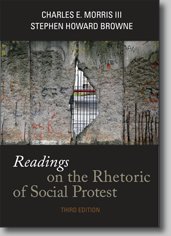|

comments
contents
preface
the editors
isbn:
9781891136306
2013
544 pages
paperback
suggested list price: $85.00
price to college bookstores:
$68.00
|
Readings
on the Rhetoric
of Social Protest
third edition
Charles E. Morris III
Syracuse University
Stephen Howard Browne
Pennsylvania State University
This highly acclaimed anthology includes thirty-five of the most significant essays from the literature. From groundbreaking theoretical works to very recent case studies, the selections reveal the evolution of a dynamic scholarship—its theoretical foundations, the debates that shape further inquiry, the critical studies that explore and illustrate broader theoretical perspectives.
Drawing on a wide variety of recent and historical movements, these essays explore the rhetorical strategies that create leaders, inspire followers, confront power, attract public support and sympathy, and allow movements to adapt to changing conditions—or that silence dissent, suppress uprising, or discredit protesters.
The third edition reflects current issues and theoretical perspectives, with an enhanced emphasis on contemporary social movements.
Substantive introductions to each chapter highlight key points, vital themes and connections, and recurring conflicts. A selected bibliography—updated and expanded in this edition—helps students launch their own research on social movements.
Previous editions of this book were reviewed in The Review of Communication and Rhetoric and Public Affairs.
FROM THE BACK COVER
ADDITIONAL COMMENTS
COMMENTS ON PREVIOUS EDITIONS
ABOUT THE EDITORS
Charles E. Morris III is Professor of Communication and Rhetorical Studies and of LGBT Studies at Syracuse University. He has a B.A. from Boston College. He received his M.A. and Ph.D. from The Pennsylvania State University. He is the cofounding editor of QED: A Journal in GLBTQ Worldmaking. His books include Queering Public Address: Sexualities in American Historical Discourse (2007), Remembering the AIDS Quilt (2011), and An Archive of Hope: Harvey Milk's Selected Speeches and Writings (2013). His essays have appeared in the Quarterly Journal of Speech, Communication and Critical/Cultural Studies, Rhetoric & Public Affairs, and elsewhere. For his work as an archival queer, Professor Morris has received two Golden Monograph Awards, the Karl Wallace Memorial Award, and the Randy Majors Memorial Award from the National Communication Association.
Stephen Howard Browne is Professor of Speech Communication at The Pennsylvania State University, where he teaches courses in rhetorical theory and criticism. He received his B.S. from the University of Oregon, his M.A. from Colorado State University, and his Ph.D. from the University of Wisconsin. He is the author of Edmund Burke and the Discourse of Virtue (1993), Angelina Grimke, Rhetoric, Identity, and the Radical Imagination (1999), and Jefferson's Call for Nationhood: The First Inaugural Address (2003). He has published more than thirty essays in the history and criticism of rhetoric in the Quarterly Journal of Speech, Communication Monographs, Rhetoric and Public Affairs, and other journals. Professor Browne has received the National Communication Association's Diamond Anniversary Book Award and the Karl Wallace Memorial Award.
|